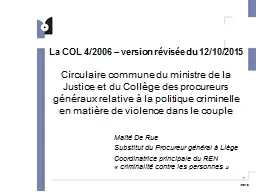PPT-What You Think Your Students Are Learning But Aren’t: Col
Author : alida-meadow | Published Date : 2015-10-20
Camille Kingman Orem Junior High School UT ckingmanalpinedistrictorg NAfME National InService Conference 2014 What You Think You Are Teaching But Arent Delusions
Presentation Embed Code
Download Presentation
Download Presentation The PPT/PDF document "What You Think Your Students Are Learnin..." is the property of its rightful owner. Permission is granted to download and print the materials on this website for personal, non-commercial use only, and to display it on your personal computer provided you do not modify the materials and that you retain all copyright notices contained in the materials. By downloading content from our website, you accept the terms of this agreement.
What You Think Your Students Are Learning But Aren’t: Col: Transcript
Download Rules Of Document
"What You Think Your Students Are Learning But Aren’t: Col"The content belongs to its owner. You may download and print it for personal use, without modification, and keep all copyright notices. By downloading, you agree to these terms.
Related Documents














